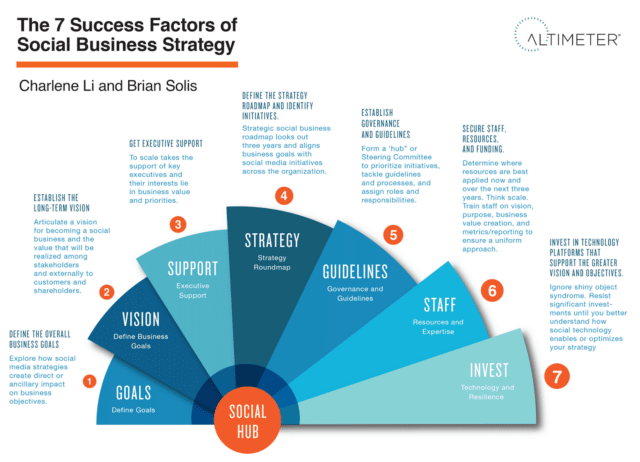
What Factors Make For A Successful Social Media Strategy? | Martech Zone
The Seven Success Factors of Social Business Strategy by Charlene Li and Brian Solis is a must-read for business leaders, marketers, and strategists aiming to integrate social media into their business models. The book provides a clear, actionable framework for creating a cohesive social business strategy that delivers measurable outcomes. Li and Solis explore the intersection of social media, business transformation, and innovation, making a compelling case for why organizations need to rethink their approach to social technologies.
About the Authors
- Charlene Li is a New York Times bestselling author, speaker, and renowned digital transformation and leadership expert. As the founder of Altimeter, a leading research firm, Li has spent years advising Fortune 500 companies on harnessing disruptive technologies’ power to drive growth and success.
- Brian Solis is a digital analyst, speaker, and bestselling author who focuses on business innovation and customer experience. As a Principal Analyst at Altimeter, Solis has helped organizations navigate digital transformation, with a keen focus on social media’s role in reshaping business strategies.
What Are The Seven Success Factors?
The heart of this book lies in its breakdown of the seven success factors that drive an effective social business strategy. Each factor builds upon the last, ensuring a clear, sustainable path to success in social business.
- Define the Overall Business Goals: The first step is identifying how social business aligns with broader business objectives. Li and Solis emphasize that organizations must move beyond engagement metrics and tie social initiatives to core business outcomes like revenue growth, customer retention, or cost reduction. This approach ensures that social media is not just an isolated activity but a key driver in achieving overarching business goals.
- Establish the Long-Term Vision: A short-sighted social strategy will limit the potential for success. The authors encourage businesses to craft a vision that stretches beyond immediate campaigns or quarterly results. This vision should align with the company’s long-term objectives, creating a north star that guides social efforts for years to come. With a strong vision, companies can adapt to changes in technology and market conditions while remaining focused on the ultimate goal.
- Ensure Executive Support: Executive buy-in is crucial for successfully executing any social business strategy. Li and Solis discuss how without backing from leadership, social initiatives often fail to gain traction within the organization. They outline strategies for securing this support, including demonstrating the business value of social efforts and aligning them with executive priorities. When leadership champions the strategy, it creates a trickle-down effect that ensures engagement across departments.
- Define the Strategy Roadmap: Once the vision and goals are set, businesses must outline a clear roadmap that details how the strategy will unfold. The roadmap should break down the strategy into actionable phases, specifying key milestones, success metrics (KPIs), and timelines. According to Li and Solis, this roadmap not only keeps teams aligned but also helps organizations track progress and make adjustments when necessary.
- Establish Governance and Guidelines: Effective social business strategies require governance frameworks that ensure consistency and compliance. The authors recommend establishing clear guidelines for employees on how to represent the brand in social channels. This includes defining roles, responsibilities, and decision-making authority. Governance ensures that all social activities are cohesive and aligned with the overall brand strategy, while also mitigating risks associated with social media engagement.
- Secure Staff, Resources, and Funding: A strong strategy requires proper resources. Li and Solis explain that organizations often fail because they do not allocate enough budget, personnel, or tools to support their social business efforts. They emphasize the importance of securing dedicated staff with the necessary skills and ensuring that there is adequate funding to sustain the strategy. Without the right resources, even the most well-planned strategy can falter.
- Invest in Technology Platforms That Evolve: The final success factor is about choosing technology platforms that can scale and adapt as business needs change. Social technologies evolve quickly, and companies need platforms that are flexible enough to grow alongside the business. The authors advise investing in tools that integrate seamlessly with existing systems and provide the necessary data to measure performance effectively. Organizations must also stay on top of emerging trends to ensure they are leveraging the best tools available.
According to the authors, the primary goal of a social business strategy is to move beyond traditional marketing and create meaningful interactions with customers that drive business value. This includes building brand loyalty, increasing customer engagement, and creating opportunities for innovation and co-creation with consumers. By tying social initiatives directly to business outcomes, companies can maximize their return on investment (ROI) and ensure long-term sustainability.
Implementing the seven success factors begins with a thorough assessment of current social efforts and identifying where gaps exist. Companies should start by defining clear business goals and aligning them with a social vision. From there, they can create a roadmap and secure executive buy-in to ensure the strategy has the support it needs to succeed. Establishing governance and allocating resources early on will also help ensure a smooth rollout.
For organizations looking to harness the full power of social business, The Seven Success Factors of Social Business Strategy offers a proven roadmap for success. The authors’ step-by-step approach makes it easy to align social efforts with broader business objectives, ensuring measurable outcomes. Get your copy today and start transforming your social media presence into a competitive advantage.





